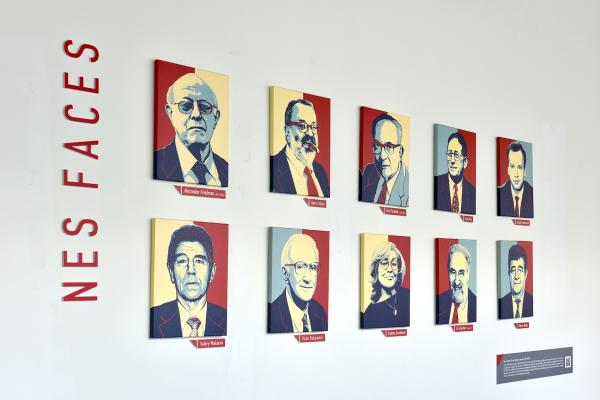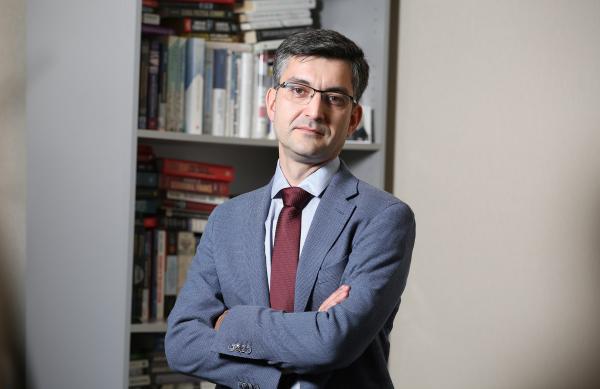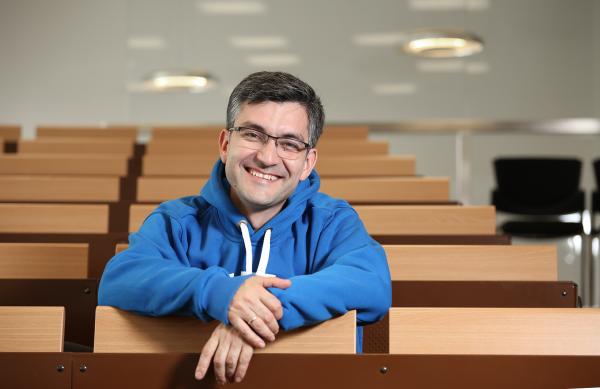Present and future of the School
— Ruben, your predecessor as Rector, Shlomo Weber, was the head of the New Economic School since 2015. Which of his achievements seem to you the most important?
— Professor Shlomo Weber headed the School at the time of crisis, when there were very serious problems both financial and organizational. His main achievement is that with him as a leader situation in NES stabilized and the university came back to the right track of development. The School resumed its usual academic activities, including scientific seminars and conferences, as well as hiring new professors. The role of the renewed International Committee of Advisers has grown significantly, and a number of our successful alumnus who work in foreign universities entered the Committee. Also, cooperation with other universities, including foreign ones, have become more active. And most importantly – the atmosphere in the team has improved greatly. For all of these we thank him and my aim now is to continue these positive developments.
— From September 1st Shlomo Weber will be a President of NES and Valery Makarov, who previously held this position will become the Honorary President. How will the roles between the President and the Rector be divided?
— The leadership of the School will remain in the hands of the Rector and the Board of Directors. The main goal of the new President will be the establishment and development of partnerships – both with our colleagues from Skolkovo and with regional and foreign universities.
— Can you please tell about your key tasks as the Rector? Which three tactical and strategic steps are you planning at first?
— It is hard to divide tactical steps from strategic ones. The main goal is not to lose focus from the academic component. I am sure that today we are the best economic university in Russia, but the competition rises. It is not a bad thing because it stimulates us to work even harder. Moreover, we have paid a lot of efforts to help or Russian colleagues. In this business, in order to stay the first you have to run forward with a wild speed. And if you are targeting the world market, then you need to run twice as fast.
Another primary goal is to ensure the financial stability of the School. In order to achieve this we need to strengthen fundraising direction as well as to ensure the transparency of everything we do and build a more understandable reporting system. That will include the issues related to the management of Endowment Fund, which was organized in order to provide financial stability and independence of the School.
The third important goal is to increase the role of our graduates in the School management and fundraising. It seems like I was destined to do it, as I am the first Rector who also studied at NES. I would like to make maximum use of the knowledge, skills and experience of graduates in managing the School and, if possible, to attract their funds. In Western universities graduates usually become key donors. However, it is understandable that in our case their smaller contribution mainly related to the youth of the School and graduates themselves. Although, I believe that there is a place for improvement here.

— If everything you have planned will be realized, how do you see NES in couple of years?
— The greatest value for me is the independence of NES. So, the main thing I would like is for NES to be in a stable position so its professors and employees would not worry about the future and concentrate on a long-term goals. Also I wish that our School will remain the leader in Russian economic education and science.
— It is not a secret that nowadays there is not the most favorable situation neither in economics nor in international relations. Does it somehow affect NES?
— The current situation, indeed, is not simple. We exist in the Russian legal field and it is not very promising for such small universities-innovators as we are. We have to spend a significant part of the resources (which we could, in our opinion, spend on something more important) in order to stay within this legal field. This kind of situation imposes some restrictions, but we have to deal with it.
International situation also narrows our capabilities. And it is not only that we cannot raise funds from abroad (including money of our graduates) without the risk of being in the list of international agents, but also that difficulties arise with development of cooperation with foreign universities. For our school it would be a significant step forward, but, unfortunately, currently there are difficulties even in the Eastern direction (China). All these are technical things that show that we have to work more.
— Educational hub Skolkovo was established in February 2017. It included New Economic School, Skoltech and Skolkovo Business School. Do you plan to continue cooperation?
— All hub members consider cooperation very promising for themselves. For example, Skolkovo Business School has accumulated knowledge and experience in the field of soft skills, whereas the New Economic School is more about hard skills. In the meantime, we can cooperate with Skoltech in working on data science. We both work with big data from different sides, they concentrate on a technical part of it and we analyze it. The potential of this cooperation is obvious.
It is very important for us to establish relationships with partners without losing our independence. Moreover, all three hub members are big and versatile organizations and there are a lot of legal issues which have to be solved, and that is slowing down the process. Although there are already some results: recently Skoltech and NES have reached an agreement that our students will be able to take courses from each other for free.
— How do you see the future of NES scientific centers? Will you actively open new ones?
— For now, we are not planning to open new scientific centers, as those that are currently working play a significant role. Center for the Study of Diversity and Social Interactions, for example, not only conducts research but also develops our relationships with universities in other regions, which is a part of NES’s mission.
Of course, we would love to strengthen the development of applied research. It is a very important direction for us (for many different reasons), but it is obvious that the efforts of our professors are not enough.

— Which scientific directions, in your opinion, are especially important to develop at NES?
— Typically, a rector does not have to decide on scientific direction as our professors have full academic freedom. My personal opinion is that nowadays everything that is related to big data is developing very fast in economic science. The concept of big data is so popular itself, that it can be called a hype – but with a difference that there are real scientific perspectives behind these words. Theoretical research is still very important though.
More and more often economists and their colleagues from the natural sciences start working in laboratories. This can be explained by the fact that technical requirements are in growth and often economists cannot process the information without machine learning specialists and big data experts. For example, economists, doctors, and IT-specialists can work jointly on the economics of health project.
NES also is starting moving towards this direction, and a good example of this cooperation is a project with Interfax Lab. Our colleagues have a massive array of data and qualified specialists, who can process it. We, in the meantime, have students and professors, who ask meaningful questions about this data. As a result, we obtain a successful interdisciplinary research. These, of course, are the first steps, but it is a very promising model of cooperation.
— The final question that has been in the air for quite some time is whether NES is planning to move to a new building.
— For now, I can say that in the near future we will not move to another building. In order to do it even after two years, we would have to make a decision now and start preparing.
But the issue itself is indeed on the agenda. There are different options of where we can move and one of the options is a Skoltech building. But construction works are still going on there, the transport infrastructure is changing and we have no idea what it will eventually look like. It is hard to make a decision when the alternatives are not clear.
Besides, the question of where the school is located is strongly related to various factors: fundraising opportunities, the opinion of students, professors and employees, and finally the choice of the building is really limited because of the high requirements that are established in order to pass the state accreditation. In general, the decision of moving to another place includes all the important aspects of the school’s functioning, so it is one of the most difficult and complex issues that we have to consider.

Biography
In 2001 Ruben finished Moscow State University with distinction, in 2002 – got his master's degree from New Economic School. Later in 2008 he got his PhD in Economics from Harvard University.
Ruben Enikolopov is a Professor at NES (since 2008) and at Pompeu Fabra University, Spain (since 2013). In 2012-2013 he also worked at the Institute for Advanced Study, Princeton.

